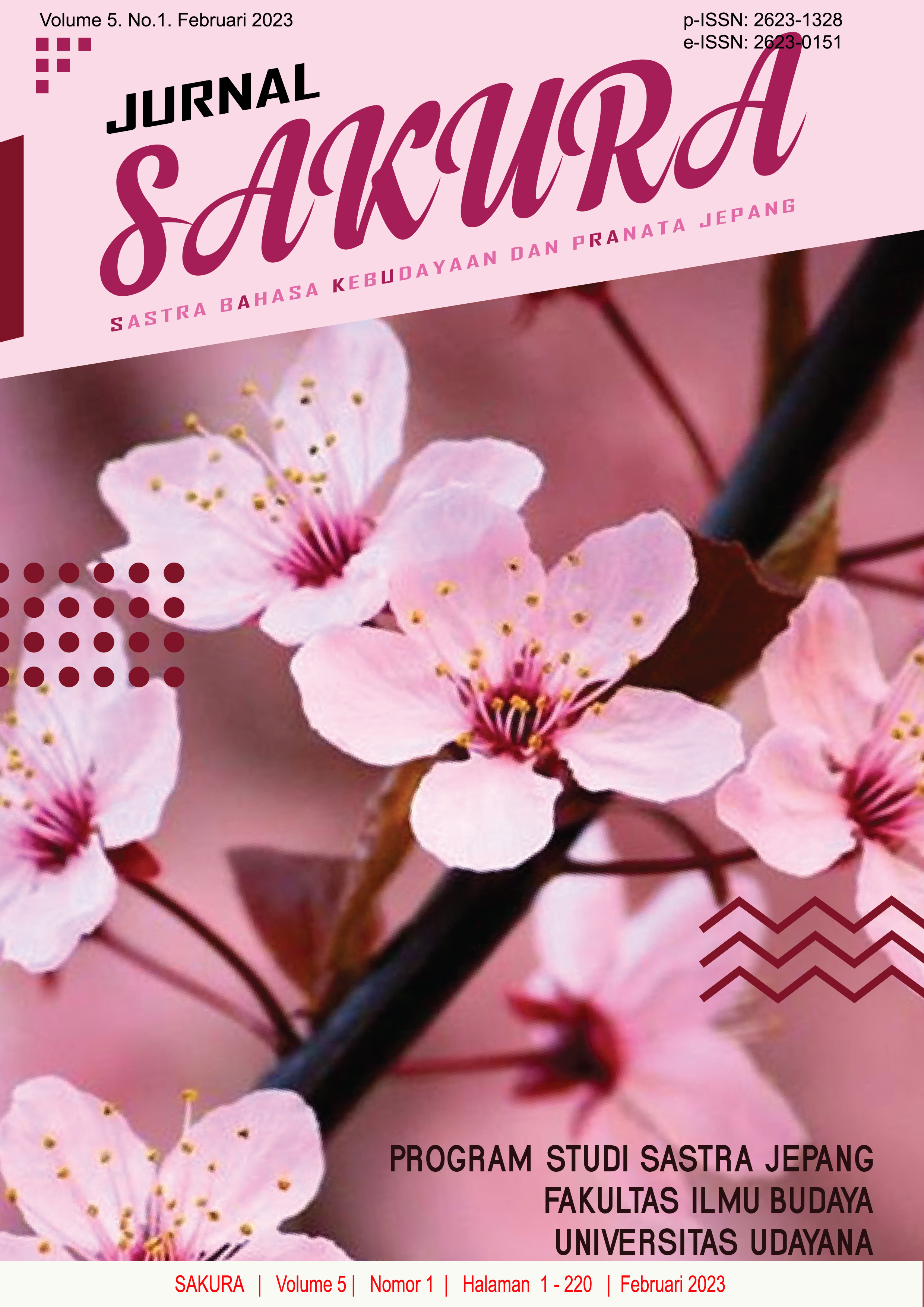Fenomena Hostess di Jepang dalam Drama Cabasuka Gakuen Karya Sutradara Takashi Kubota
Abstract
"The Hostess Phenomenon in Japan in the Drama Cabasuka Gakuen by Director Takashi Kubota" is the title of this study. The purpose of this study is to learn more about the phenomenon, the duties of a hostess, and the efforts made by the hostess to deliver the best possible service. The descriptive analysis method was employed in this study. Service Theory, Semiotics Theory, and Sociology of Literature Theory are the theories utilized. According to the study's findings, it is known that the hostess phenomenon can be seen in three ways, 1) factors that cause someone to become a hostess, there are (1) bad financial conditions; (2) does not have an education degree; 2) the qualifications of a hostess; 3) the job of a hostess, there are (1) welcoming clients; (2) serving clients; (3) take the client out when finished visiting. A hostess makes the following efforts to give the best service: (1) maintaining an attractive appearance; (2) being adaptable in all circumstances; (3) listening to client complaints; (4) becoming familiar with the terms used in the cabaret club; and (5) fulfilling client requests outside the cabaret club. The findings of this study show that the desire of high school students to work as hostesses, which is thought to be an easy job to obtain and do, is actually not as easy as assumed. In order to keep their place, hosts must compete with one another.
Downloads
References
Danesi, Ma. (2011). Pesan, Tanda, dan Makna: Buku Teks Dasar Mengenai Semiotika dan Teori Komunikasi. Yogyakarta: Jalasutra.
Gumilang, M.T. (2018). “Pengaruh Lokasi dan Daya Tanggap Terhadap Kepuasan Konsumen Mini Soccer 88 Ciamis” (tesis). Tasikmalaya: Program Studi Manajemen Fakultas Ekonomi Universitas Siliwangi.
Hasani, R.N.(2017). Representasi Karakteristik Host di Jepang dalam Drama Ouran Koukou Hosutobu Karya Sutradara Satoshi Kan, Atsushi Sato, dan Hiroki Shibasaki (thesis). Malang: Fakultas Ilmu Budaya, Universitas Brawijaya.
Henson, K.D.( 2013). “For $1000 I’ll love you too: an understanding of Japanese hosts and host clubs” (tesis). Amerika: Anthropology Capstone, Marshall Universty.
Kominato, T. (2012). “Feminist Aspect of “Water Trade” in Japan”. (Diakses pada 15 April 2021 pada pukul 16.05 WITA dari alamat https://www.toyo.ac.jp/uploaded/attachment/10407.pdf)
Koueki Shadanhoujin Zenkoku Kyuujin Joujou Kyoukai.(2022). Nenrei Dake de Handansezu, Sono Hito no Miryoku wo Mitsuketemimasenka. (Diakses pada 8 Agustus 2022 pada pukul 20.03 WITA dari alamat https://www.zenkyukyo.or.jp/wp/wp-content/uploads/2022/06/%E3%83%AF%E3%83%B3%E3%83%9D%E3%82%A4%E3%83%B3%E3%83%882%E5%B9%B4%E9%BD%A2%E5%88%B6%E9%99%90202206.pdf).
Kyouko, I. (2013). Chotto Shita Kokorozukai de Konna ni Kawaru Omotenashi Sekkyaku Jutsu. Tokyo: Doubunkanshuppan.
Malki, S.(2005). (Bunken Shoukai) Anne Allison, Nightwork: Sexuality, Pleasure, and Corporate Masculinity in a Tokyo Hostess Club (University of Chicago Press, 1994). Kyoto Journal of Sociology XIII, 13, hlm. 137-142.
Nemoto, K.(2010). Sexual harassment and gendered organizational culture in Japanese firms. Gender and sexuality in the workplace, 20, hlm.302-325.
Qodratillah, M.T. (2016). Tata Istilah. Jakarta: Pusat Pembinaan Badan Pengembangan dan Pembinaan Bahasa Kementerian Pendidikan dan Kebudayaan.
Shion, N. (2013). “Okama” to Kyaku no Kaiwa kara Miru Sekkyaku Gengo Sutorateji ni Kansuru Ikkou Satsu. Soukendai Bunka Kagaku Kenyuu, 9, hlm. 123-134.
Wellek, R dan Warren, A. (1995). Teori Kesusastraan. (Melani Budianta). Jakarta: Gramedia.
Werdaningtyas, Y.(2020). “Pengaruh Handling Complaint dan Kualitas Pelayanan Customer Service Terhadap Kepuasan Nasabah Menabung di Bank Syariah Mandiri KCP Tulungagung” (skripsi). Tulungagung: Jurusan Perbankan Syariah Fakultas Ekonomi dan Bisnis Islam Institut Agama Islam Negeri Tulungagung.
Wiyatmi. (2013). Sosiologi Sastra. Jakarta: Kanwa Publisher.
Yumiko, K.(2013). Sei no Shouhinka to Shokugyou Sutiguma (Kyabakura ni Taisuru Seijin Danjo no Ishiki Chousa kara). GEMC Journal, 5, hlm. 32-47.













